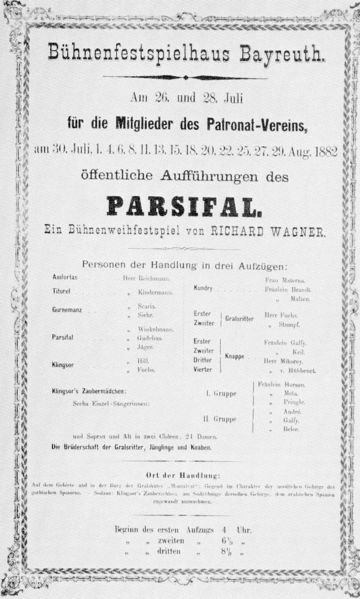Music with Ease > Operas of Richard Wagner > Parsifal (Wagner) - History
The History of Parsifal
An Opera by Richard Wagner
"Parsifal" was Wagner’s last music-drama. Yet the subject had occurred to him as early as 1857, when he was gathering the materials or Tannhäuser" and "Lohengrin". This was twenty-six years before his death. "Wagner told me in 1877," says Professor Tappert, "that in the fifties, when in Zurich, he took possession of a charming new house, and that, inspired by the beautiful spring weather, he wrote out that very day the sketch of the Good Friday music."

Poster for the original production of Parsifal in Bayreuth, Germany, July 26-27, 1882
The text of the work was completed in the early part of 1877, and was published in December that year. Wagner was sixty-five when he started to write the music. He finished the First and Second Acts in 1878, and the Third Act in 1879, and completed the instrumentation at Palermo in the January of 1882, only eleven months before his end came.
The first performance took place at Bayreuth on July 26, 1882; and as the copyright is still (1908) held by the Wagner family, "Parsifal" has not yet been heard elsewhere, with the single exception of New York (1903), the European copyright not being operative in America. Wagner objected to "Parsifal" being given except at Bayreuth. When impresario Neumann, in 1882, asked to be allowed to include the latest music-drama in his European "Ring" tournée, Wagner answered him thus: "’Parsifal’ cannot be played elsewhere than at Bayreuth for particular reasons which seemed so convincing to my august patron, the King of Bavaria, that he gave up the idea of a replica of the Bayreuth performances at the Munich theatre. I cannot authorise a performance on any stage, unless a real Wagner Theatre is established -- a Festival Theatre which, reduplicated by propaganda, would spread through the whole world fully and faithfully what I have done in my Bayreuth theatre." In another letter he said that performance of "Parsifal" would be restricted to the "Bünhenweifestspiel" -- a word which may be translated freely as a "a festival that consecrates the stage."
This translation emphasises to many Wagnerians "the inadvisability -- to use no stronger term -- of performing ‘Parsifal’ in any but a theatre specially devoted to such performance; set apart, as is the Bayreuth Festival House, from the busy haunts of men, and necessitating something in the nature of a pilgrimage to reach it." Such a view can hardly be accepted. Thousands of earnest music-lovers, lovers especially of Wagner, cannot go to Bayreuth. Why should they be prevented from hearing. "Parsifal"? There is more than a suspicion that Wagner’s prohibition was prompted as much by considerations of finance as of art. But however that may be, it is pleasing to reflect that the coming expiry of the copyright will frustrate his attempt to make "Parsifal" a sort of preserve of the elect. Of course, it is by no means certain that "Parsifal" will be staged in England. It will assuredly not be staged without protest. Biblical and sacred subjects have been banished from the British stage since the days of the miracle play. But the impressions admittedly conveyed by the Oberammergau Passion Play show that the stage may yet prove as much of a power in sacred things as the pulpit; and there is no reason why the point should not be tested in England with "Parsifal."
England has at any rate had the keenest interest in "Parsifal" from the first. A detailed analysis of the score was printed in a leading musical journal in the summer of 1882, about the date of the first performance at Bayreuth. In that analysis appeared the following significant passage:
We would pause to remark upon the extraordinary attention which a work of this composer now commands. The libretto was written and published in 1877, when a large edition was immediately sold; the music was only completed a few weeks ago, yet musicians have eagerly striven for a sight of it before publication, and two full analytical accounts have appeared in German papers, while a minute thematic guide by Herr von Wolzogen and some drawing-room arrangements by J. Rubinstein have been for some little time before the public, the vocal score being only just now, as we write these words, completed. Not only this, but nearly three months before the production at Bayreuth photographs of the scenery and dresses are being sold.
What a triumph for the genius who thirty years before that could not gain a hearing anywhere!
Music With Ease | About Us | Contact Us | Privacy | Sitemap | Copyright | Terms of Use © 2005-23 musicwithease.com. All Rights Reserved. |
